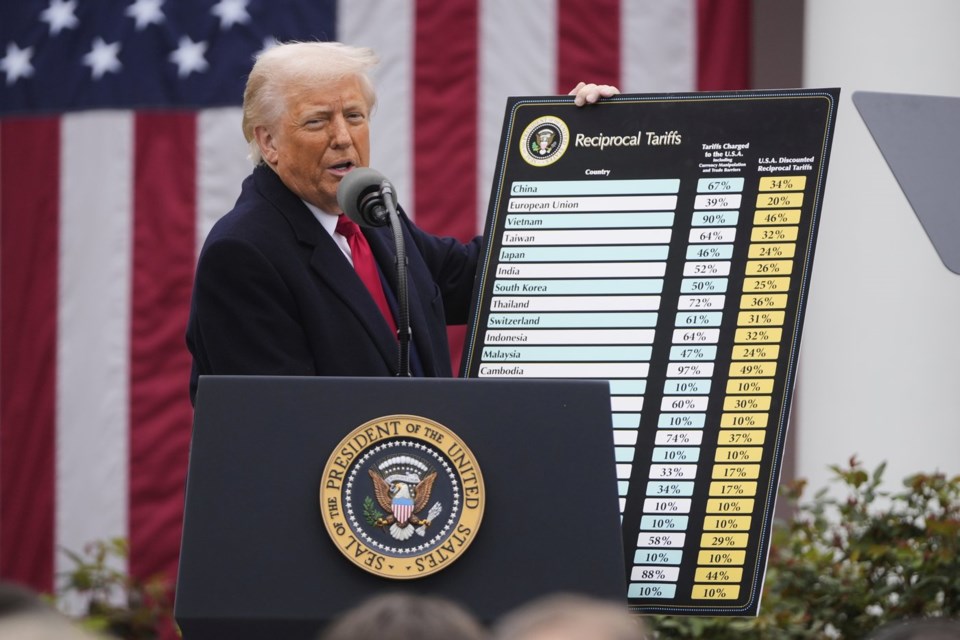WASHINGTON — United States President Donald Trump hit a major legal barrier for his plan to realign global trade after a federal court on Wednesday blocked both the sweeping "Liberation Day" tariffs and the fentanyl-related duties against Canada and Mexico.
The U.S. Court of International Trade decision said Trump does not have the authority to wield tariffs on nearly every country through the use of the International Economic Emergency Powers Act of 1977.
The act, usually referred to by the acronym IEEPA, is a national security statute that gives the U.S. president authority to control economic transactions after declaring an emergency.
The ruling from the three-judge panel at the New York-based federal court said "any interpretation of IEEPA that delegates unlimited tariff authority is unconstitutional." It said "the challenged tariff orders will be vacated," representing a nationwide injunction against any further imposition of the duties.
It's expected the Trump administration will appeal. White House spokesman Kush Desai said "it is not for unelected judges to decide how to properly address a national emergency."
"President Trump pledged to put America First, and the Administration is committed to using every lever of executive power to address this crisis and restore American Greatness," Desai said in an emailed statement.
Global stock markets have been in turmoil and supply chains have been upended as Trump used unprecedented presidential power to enact his tariffs. Up until Trump's return to the White House, IEEPA had never been used by a president to impose tariffs.
Wednesday's decision sowed doubt into how Trump will continue to implement his signature economic tariff policy.
Trump hit Canada with economywide duties in March after he declared an emergency at the northern border related to the flow of fentanyl. He partially paused levies a few days later for imports that comply with the Canada-U.S.-Mexico Agreement on trade.
U.S. government data shows a minuscule volume of fentanyl is seized at the northern border.
Trump took his trade war to the world in April with duties on nearly every country saying America's trade deficits amounted to a national emergency. The president walked back the most devastating duties a few hours later but left a 10 per cent universal tariff in place for most countries.
Trump said the 90-day pause would give countries time to negotiate a deal. The president said if countries didn't comply he would simply set tariff rates himself.
The White House on Wednesday maintained that "historic and persistent" trade deficits were an emergency. Desai said deficits "decimated American communities, left our workers behind, and weakened our defense industrial base – facts that the court did not dispute."
Wednesday's ruling combined two different cases that were pushing against Trump's tariffs. One included five American small businesses specifically pushing against Trump's worldwide tariffs, and the other stemmed from 12 states arguing against both the "Liberation Day" duties and the fentanyl-related tariffs.
At least seven lawsuits are challenging the tariffs.
"This is a giant power grab by the president and the court was very clear that he cannot claim this kind of unlimited tariff authority," said George Mason University law professor Ilya Somin.
Somin, along with the Liberty Justice Center, represents the small businesses. They argued IEEPA does not mention tariffs, nor is there even a synonym, such as duties. The U.S. Constitution gives power over taxes and tariffs to Congress and Somin said Trump is misusing the statute.
In the separate case, lawyers for Arizona, Colorado, Connecticut, Delaware, Illinois, Maine, Minnesota, Nevada, New Mexico, New York, Oregon and Vermont argued that tariffs make U.S. trade policy dependent on Trump’s whims.
The court found Trump's unlimited use of tariffs to hit every country with duties is not in line with IEEPA and is unconstitutional. The decision separately blocked the fentanyl tariffs because it said "they do not deal with the threats" Trump used to justify the duties in his executive order.
Somin said it "is a big victory for us and for opponents of these illegal, harmful and abusive tariffs." It is also a big victory for Canada, he added.
Somin said the White House is likely to ask an appellate court to lift the injunction halting the tariffs and said an amicus brief — a legal submission from a group that's not party to the action — from Canada would be welcomed.
Canada is still being hit with tariffs on steel, aluminum and automobiles. Trump used different powers under the Trade Expansion Act of 1962 to enact those duties.
This report by The Canadian Press was first published May 28, 2025.
Kelly Geraldine Malone, The Canadian Press

